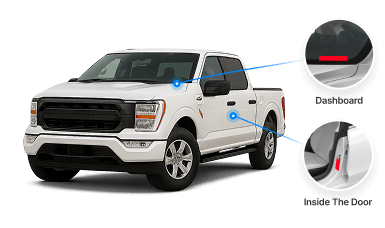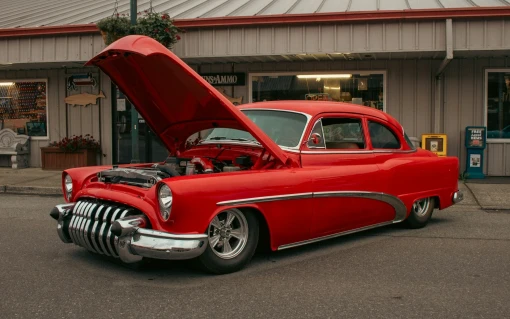
How to Check What Engine Your Car Has
If you're not totally sure which engine is in your car, you're not alone. This...
Looking for the VIN?
Here is there you’ll find it:

To check an RV VIN number, find the 17-character VIN on the RV (often on the dashboard near the windshield, the driver’s door jamb, or a frame label) and match it to the title/registration. Then use our best free vin check tool to decode the RV’s specs and spot red flags such as title issues, salvage/flood branding, mileage inconsistencies, recalls, or major damage before you buy.
When you get a VIN report, you can see the history of the vehicle before you buy it and get a NADA VIN check to tell you the market value of the vehicle.
A VIN number is a 17-digit code that is unique to each vehicle and trailer. This code includes information about where and when the vehicle was manufactured, as well as major equipment options. Using a trailer VIN lookup tells you important specs like the length of the trailer, as well as the number of axles.
The last few digits of the VIN is a serial number. While serial numbers repeat, no other vehicle or trailer on the road has the same serial number, manufacturing and equipment digits. Our lookup tool decodes all this information for free, so you can compare the motorhome or trailer with its factory specifications.
Motorhomes have two VIN numbers. The number issued by the chassis company tells you about the basic mechanical components. The number issued by the motorhome manufacturer tells you about what was added to turn the chassis into a complete recreational vehicle. Travel trailers also have VINs that contain manufacturer information and specs.
Using our decoder can tell you a lot about a recreational vehicle, whether it’s one you own or one you’re looking to buy. An RV trailer VIN tells you the official length of the trailer, the number of axles, and the hitch type. The chassis VIN gives you information about the chassis size, the engine and the manufacturing year, which is helpful for verifying the vehicle’s construction. The manufacturer’s VIN helps you verify the model, as well as the GCWR, which determines the vehicle’s weight class. This information helps you verify the accuracy of the sale listing, as well as the licenses and insurance you’ll need to get it on the road. After buying a recreational vehicle or trailer, you can use this information to get the right parts for repairs.
Before you use our RV lookup tool, you need to find the VIN. While a travel trailer has a single trailer VIN, motorhomes have two VINs. The first VIN is issued by the chassis manufacturer, and the second VIN is issued by the motorhome manufacturer. For example, let’s say you have a Winnebago View. This Class C motorhome started life as a Sprinter chassis, which has a VIN issued by Mercedes Benz. After Winnebago builds the “home” part of the motorhome on top of this chassis, they issue their own VIN number.
When you register or insure your vehicle, you need the motorhome VIN. If you want to learn more about the chassis, including the original engine and transmission, you should look up the chassis manufacturer VIN. Need parts or service for your vehicle? You need the chassis VIN for the vehicle components, like brake pads and oil filters. The motorhome VIN is used for everything added to the chassis, including plumbing, exterior decals and auxiliary power components.
Some manufacturers also use internal codes, like Fleetwood’s “FIN”, or “Fleetwood Identification Number”. These codes don’t have 17 digits and aren’t used for documentation. Instead, they’re only used to order replacement parts directly from the manufacturer.
Placement of the VIN isn’t standardized on recreational vehicles. Here are some places you should check to find the VIN number on your vehicle or trailer.
Motorhome VIN Locations
If the number is a part of the original chassis, it’s probably the chassis manufacturer’s ID. This includes the engine, frame and, if the vehicle has a van or truck front end, the dashboard. A firewall number could be either. If the chassis has a van body, it’s from the chassis manufacturer. If the cab is built by the motorhome manufacturer, it’s their ID. All the other tags should be from the motorhome manufacturer. Don’t worry if you aren’t sure which code you have. Our RV VIN decoder is free, so you can type in the number and see which manufacturer issued the number.
Travel Trailers and Campers
With trailer VIN number lookup, there’s only one number to worry about. Remember that the VIN is 17 digits long. If you find a number that’s longer or shorter, it’s a serial number issued by the manufacturer for internal use.
What about truck camper VIN lookup? They’re legally considered cargo, not vehicles, so they don’t have a VIN. This eliminates most of the paperwork tied to vehicle and travel trailer VIN lookup, so there’s no way to get a detailed history on this type of camper.
Once you have the VIN, you can use our site for a free trailer VIN check or recreational vehicle check. From there, you can order a complete history report on the trailer or vehicle.
The VIN acts as an identifier for the vehicle or trailer in official documents. By pulling information from available records, our VIN report builds a history of the vehicle, from when it rolled off of the factory line to today. Here’s what you’ll find in this report:
This information helps you determine a fair offer and helps you avoid lemons and vehicles that might be repossessed. Using our reports can save you a considerable amount of time and guesswork when hunting down your next camping vehicle, and gives you the peace of mind that what you buy doesn’t have any hidden problems.
What does a VIN off of an RV look like? Here are examples of chassis, trailer and motorhome vehicle identification numbers.
Discover expert tips, news and advice on buying and maintaining used vehicles

If you're not totally sure which engine is in your car, you're not alone. This...

Use your Porsche’s VIN to access tools that reveal current warranty coverage a...

Understand what each segment of your GM VIN means and how it can provide cruci...